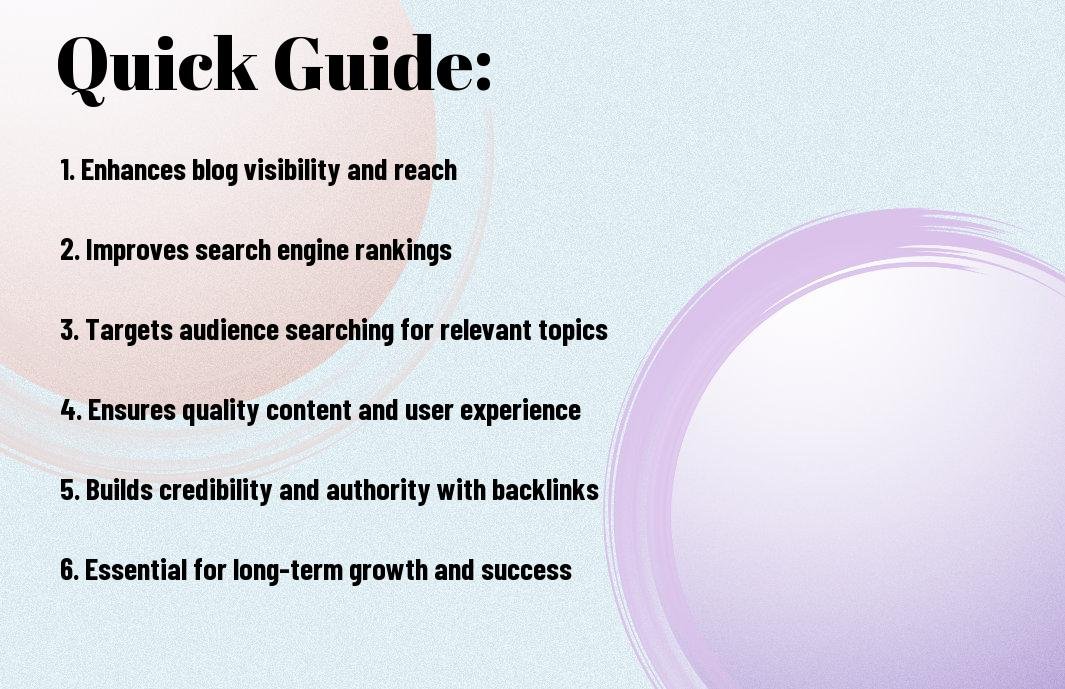As a blogger, you want to reach a wider audience and increase your online visibility. But with millions of blogs out there, how do you stand out from the crowd? The answer lies in Search Engine Optimization (SEO). By understanding what SEO is and why it’s crucial for your blog, you can unlock the secret to driving more traffic, increasing engagement, and establishing your blog as a trusted authority in your niche. In this guide, we’ll explore the world of SEO, debunk common myths, and provide actionable tips to help you optimize your blog for success.

Key Takeaways:
- SEO Increases Visibility: Optimizing your blog for search engines improves its visibility, attracting a larger audience and increasing readership and engagement.
- Keyword Research Is Crucial: Identifying the right keywords and phrases helps create content that addresses your audience’s needs, driving more traffic to your blog.
- On-Page and Technical SEO Matter: Optimizing title tags, meta descriptions, content quality, website speed, mobile-friendliness, and secure connections are necessary for improving search engine rankings.
- Backlinks Establish Credibility: Earning backlinks from reputable websites increases your blog’s authority and credibility, leading to higher search rankings and organic traffic.
- SEO Drives Long-Term Growth: By investing in SEO, you can achieve sustainable growth and long-term benefits for your blog, differentiating it from competitors and reducing the need for paid advertising.

Understanding SEO
Before venturing into the importance of SEO for your blog, it’s imperative to understand what SEO is and how it works.
Definition of SEO
Any online content creator wants their work to be seen by as many people as possible. Search Engine Optimization (SEO) is a set of strategies and techniques designed to improve the ranking of web pages in organic search results, making it more likely for your content to reach a larger audience.
Explanation of how search engines work
For search engines like Google to provide relevant results, they use complex algorithms to crawl, index, and rank web pages. These algorithms take into account various factors, including keyword usage, content quality, and technical aspects of your website.
With this in mind, search engines can provide users with the most relevant and useful results for their search queries. As a blogger, understanding how search engines work is crucial to creating content that resonates with your target audience and ranks higher in search engine results pages (SERPs).
Types of SEO
One of the crucial aspects of understanding SEO is recognizing its different types, each playing a vital role in optimizing your blog for search engines.
- Keyword Research
- On-Page SEO
- Technical SEO
- Backlinks
| Type of SEO | Description |
| Keyword Research | Identifying relevant keywords and phrases to optimize your content |
| On-Page SEO | Optimizing website elements like title tags, meta descriptions, and content |
| Technical SEO | Ensuring website technicalities like speed, mobile-friendliness, and security |
| Backlinks | Earning links from reputable websites to increase credibility and authority |
Thou shall not neglect these types of SEO, for they are crucial to your blog’s success.
Keyword Research
Researching keywords is like finding the hidden treasures of your niche. By identifying the right keywords, you can create content that resonates with your target audience and attracts more organic traffic.
On-Page SEO
What makes your blog stand out from the crowd? On-page SEO techniques like optimizing title tags, meta descriptions, and content help search engines understand your blog’s context and enhance user experience.
Plus, on-page SEO is not just about search engines; it’s also about creating an engaging and user-friendly experience for your readers.
Technical SEO
One of the most critical aspects of technical SEO is ensuring your website meets the technical requirements of modern search engines. This includes factors like website speed, mobile-friendliness, and secure connections (HTTPS).
The importance of technical SEO cannot be overstated, as it directly impacts your blog’s web ranking and user experience.
Backlinks
With backlinks, you can increase your blog’s credibility and authority in the eyes of search engines. Earning high-quality backlinks from reputable websites is like getting a seal of approval for your content.
Keyword-rich backlinks can also help you rank higher for specific keywords, driving more targeted traffic to your blog.
Factors Affecting SEO
Now, let’s explore the factors that affect your blog’s SEO. These factors can make or break your blog’s visibility in search engine results pages (SERPs).
- Content Quality
- Website Structure
- User Experience
- Backlinks
- Technical SEO
Content Quality
On top of creating high-quality content, you need to ensure that it’s relevant, informative, and engaging. Your content should provide value to your readers and answer their questions.
Website Structure
For a search engine to crawl and index your website efficiently, it’s vital to have a well-structured website. This includes organizing your content into logical categories and using header tags to highlight important keywords.
Structure is key when it comes to website organization. A clear hierarchy of pages and categories helps search engines understand your content and improves your website’s crawlability.
User Experience
Website usability plays a significant role in SEO. You need to ensure that your website is easy to navigate, loads quickly, and provides a seamless user experience across different devices.
Plus, a positive user experience can lead to higher engagement, longer session durations, and lower bounce rates, all of which are important SEO metrics.
Any failure to optimize these factors can negatively impact your blog’s SEO, making it harder to attract and retain readers.
Pros of SEO
Not only does SEO improve your blog’s visibility, but it also offers several benefits that can take your online presence to the next level.
Increased Visibility
With SEO, you can increase your blog’s visibility in search engine results, making it more likely to attract potential readers who are actively searching for topics relevant to your niche. This means you’ll get more eyes on your content, increasing your chances of converting visitors into loyal readers or customers.
Quality Traffic
While other marketing strategies may drive traffic to your blog, SEO attracts high-quality traffic that is more likely to engage with your content and convert into leads or sales. This is because SEO targets users who are actively searching for specific keywords and phrases related to your niche.
Impact of quality traffic on your blog cannot be overstated. It not only increases engagement but also boosts your conversion rates, ultimately leading to more sales and revenue.
Credibility and Trust
Search engines like Google prioritize high-quality, relevant content, which means that when your blog appears at the top of search engine results, it establishes your brand as a trustworthy and credible source in your industry. This can lead to more loyal readers, increased brand recognition, and ultimately, more business opportunities.
Traffic generated through SEO is often seen as more trustworthy, as users are more likely to trust search engine results over paid advertisements. This means that SEO can help you build a loyal following and establish your brand as an authority in your niche.
Cost-Effectiveness
Any marketing strategy that drives traffic to your blog without breaking the bank is a win-win. SEO is a cost-effective way to attract organic traffic, reducing your reliance on paid advertising and increasing your return on investment (ROI).
Targeted SEO strategies can help you attract high-quality traffic without spending a fortune on ads. This means you can allocate your budget more efficiently, focusing on other areas of your business that need attention.
By incorporating SEO into your marketing strategy, you can reap these benefits and more, ultimately driving more traffic, engagement, and sales to your blog.
Cons of SEO
While SEO offers numerous benefits, it’s necessary to acknowledge its drawbacks. For instance, SEO requires significant time and effort, and its complexity can be overwhelming.
Time-Consuming
Timewise, SEO can be a significant commitment. You’ll need to invest hours in keyword research, content creation, and optimization, which can take away from other important tasks. This can be particularly challenging for solo bloggers or those with limited resources.
Complexity
Even experienced bloggers can find SEO complex and difficult to grasp. With constant algorithm updates and changing best practices, it’s easy to feel overwhelmed. The complexity of SEO can lead to frustration and burnout if not managed properly.
Cons of SEO complexity can be further exacerbated by the need to stay up-to-date with the latest trends and algorithm changes. This requires ongoing learning and adaptation, which can be time-consuming and stressful. Failing to keep up with these changes can result in decreased rankings and lost traffic.
By understanding these cons, you can better prepare yourself for the challenges of SEO and develop strategies to overcome them.
Step-by-Step SEO Guide for Bloggers
Once again, SEO is a crucial aspect of blogging, and understanding its various components is crucial for success. Here’s a step-by-step guide to help you get started:
| SEO Component | Description |
|---|---|
| Keyword Research and Planning | Identify relevant keywords and phrases to target in your content |
| On-Page Optimization | Optimize your website’s elements, such as title tags, meta descriptions, and content |
| Technical Optimization | Ensure your website meets technical requirements, such as website speed and mobile-friendliness |
| Backlink Building | Earn high-quality backlinks from reputable websites to increase credibility and authority |
Keyword Research and Planning
With the right keywords, you can create content that resonates with your target audience. Conduct thorough keyword research to identify relevant terms and phrases that potential readers are using in search engines. This will help you increase your blog’s visibility and attract more organic traffic.
On-Page Optimization
The key to successful on-page optimization is to ensure that your website’s elements are optimized for search engines. This includes optimizing title tags, meta descriptions, and header tags, as well as creating high-quality, engaging content that addresses the needs of your target audience.
Bloggers, remember that on-page optimization is not a one-time task. It requires regular monitoring and updates to ensure that your website remains optimized and competitive.
Technical Optimization
OnPage technical optimization is critical for improving your website’s performance and search engine rankings. Ensure that your website is mobile-friendly, has a secure connection (HTTPS), and loads quickly. These factors can significantly impact your website’s credibility and authority in the eyes of search engines.
Keyword research plays a crucial role in technical optimization. By understanding what keywords your target audience is using, you can optimize your website’s technical elements to improve its performance and search engine rankings.

Common SEO Mistakes to Avoid
Despite the importance of SEO, many bloggers make common mistakes that can harm their website’s ranking and visibility. To avoid these pitfalls, it’s important to understand what not to do when optimizing your blog for search engines.
Keyword Stuffing
There’s a fine line between optimizing your content with relevant keywords and overdoing it. Keyword stuffing, where you excessively use keywords in your content, can lead to penalties from search engines. This tactic may have worked in the past, but today, it’s considered a black hat SEO technique that can harm your website’s credibility.
Ignoring Mobile Optimization
Stuffing your website with too much content and neglecting mobile optimization can be detrimental to your SEO efforts. With most users accessing websites through their mobile devices, it’s crucial to ensure that your website is mobile-friendly and provides a seamless user experience.
Avoid ignoring mobile optimization, as it can lead to a significant drop in search engine rankings. According to Google, 61% of users are unlikely to return to a website that’s not mobile-friendly. Ensure that your website is responsive, and the content is easily accessible on various devices.
Neglecting Meta Tags
Keyword research is crucial, but neglecting meta tags can render your efforts useless. Meta tags, including title tags and meta descriptions, provide search engines with important information about your content. Failing to optimize these tags can result in lower search engine rankings and reduced click-through rates.
Optimizing your meta tags is crucial, as they provide a snapshot of your content to search engines and users. By crafting compelling and informative title tags and meta descriptions, you can increase your website’s visibility and drive more organic traffic. For example, if you’re writing about the benefits of blogging for SEO, you can check out How EXACTLY Does Blogging Help with SEO? [6 Ways] to learn more about the importance of meta tags in SEO.
Advanced SEO Strategies
After mastering the basics of SEO, you can take your blog to the next level by implementing advanced SEO strategies that can further improve your search engine rankings and drive more traffic to your site.
Here are some advanced SEO strategies you can use:
- Content Marketing
- Link Building
- Technical SEO Audits
| Strategy | Description |
|---|---|
| Content Marketing | Creating high-quality, relevant, and valuable content that attracts and engages your target audience. |
| Link Building | Earning high-quality backlinks from authoritative sources to increase your blog’s credibility and authority. |
| Technical SEO Audits | Identifying and fixing technical issues on your website that can improve its performance and search engine rankings. |
Content Marketing
For creating effective content marketing strategies, focus on producing high-quality, engaging, and informative content that resonates with your target audience. This can include blog posts, videos, infographics, and more.
Link Building
Marketing your blog through link building involves earning high-quality backlinks from authoritative sources. This can be achieved through guest blogging, broken link building, and resource pages.
Role of link building in SEO cannot be overstated. It not only increases your blog’s credibility and authority but also drives more traffic to your site. A single high-quality backlink can increase your search engine rankings significantly.
Technical SEO Audits
Clearly, technical SEO audits are important for identifying and fixing technical issues on your website that can improve its performance and search engine rankings. This includes optimizing website speed, ensuring mobile-friendliness, and securing connections (HTTPS).
Link between technical SEO audits and search engine rankings is crucial. A slow website can lead to a significant drop in search engine rankings. By conducting regular technical SEO audits, you can ensure that your website is easily accessible and performs well in search engine results pages (SERPs).
SEO Tools and Resources
Keep in mind that having the right tools and resources is vital to implementing an effective SEO strategy for your blog.
Keyword Research Tools
Assuming you want to create content that resonates with your target audience, you’ll need to conduct thorough keyword research. Tools like Google Keyword Planner, Ahrefs, and SEMrush can help you identify relevant keywords and phrases, analyze their search volume, and determine their competition level.
On-Page Optimization Tools
Key to optimizing your blog posts for search engines is ensuring that each element, from title tags to meta descriptions, is optimized for maximum visibility. Tools like Yoast SEO, All in One SEO Pack, and Screaming Frog can help you analyze and improve your on-page SEO.
Understanding how to use these tools effectively is crucial. For example, Yoast SEO can analyze your content’s readability, suggesting improvements to make it more engaging and user-friendly. By leveraging these tools, you can ensure that your blog posts are optimized for both search engines and human readers.
Technical SEO Tools
There’s more to technical SEO than just ensuring your website is mobile-friendly and has an SSL certificate. Tools like Google PageSpeed Insights, GTmetrix, and Pingdom can help you identify areas for improvement, such as page speed and loading times, and provide recommendations for optimization.
Right from the start, it’s vital to prioritize technical SEO. A slow-loading website can lead to high bounce rates and a negative user experience, while a secure connection can boost your website’s credibility and trustworthiness. By using these tools, you can identify and fix technical issues that may be hindering your blog’s performance.
Measuring SEO Success
Unlike other marketing strategies, SEO success is not immediately apparent. It takes time, effort, and patience to see the results of your optimization efforts. However, with the right metrics and tools, you can track your progress and adjust your strategy accordingly.
Setting SEO Goals
Assuming you have a clear understanding of your target audience and their search behavior, setting specific, measurable, achievable, relevant, and time-bound (SMART) SEO goals is crucial. This could include increasing organic traffic by 20% in the next quarter or improving your website’s average ranking position by 30% in the next six months.
Tracking SEO Metrics
Some of the key SEO metrics you should track include organic traffic, search engine rankings, bounce rate, and conversion rate. These metrics provide insights into how users interact with your website and help you identify areas for improvement.
Setting up Google Analytics and Search Console can help you track these metrics and gain a deeper understanding of your website’s performance. For instance, you can use Google Analytics to track organic traffic and conversion rates, while Search Console provides insights into search engine rankings and impressions. By regularly monitoring these metrics, you can adjust your SEO strategy to optimize your website’s performance and drive more organic traffic.

SEO for Beginners
Many new bloggers are intimidated by the concept of SEO, but it’s actually quite straightforward once you understand the basics.
Basic SEO Concepts
Basically, SEO is about optimizing your blog posts to rank higher in search engine results pages (SERPs). This involves understanding how search engines work, what people search for, and the keywords and phrases they use.
Simple SEO Strategies
If you’re just starting out, don’t worry about complicated SEO techniques. Instead, focus on simple strategies like using relevant keywords in your post titles, meta descriptions, and headings.
Simple SEO strategies can make a big difference in your blog’s visibility. For example, using keywords in your post titles can increase your click-through rate by up to 20%. Additionally, optimizing your meta descriptions can improve your search engine ranking by up to 10%. By implementing these simple strategies, you can start seeing improvements in your blog’s traffic and engagement.
SEO for Experienced Bloggers
All experienced bloggers know that SEO is crucial for their blog’s success. However, as you explore deeper into the world of SEO, you’ll discover that there’s more to it than just keyword research and on-page optimization.
Advanced SEO Concepts
You’re likely familiar with the basics of SEO, but now it’s time to examine more advanced concepts. These include:
- Entity-based optimization
- Structured data and schema markup
- Internal linking strategies
- Content clustering and topic modeling
| Advanced SEO Concept | Description |
|---|---|
| Entity-based optimization | Optimizing your content around entities, such as people, places, and organizations, to improve search engine understanding. |
| Structured data and schema markup | Adding markup to your HTML to help search engines understand the context and meaning of your content. |
Complex SEO Strategies
There’s more to SEO than just optimizing individual pages. Complex SEO strategies involve looking at the bigger picture and optimizing your entire website.
Plus, you’ll need to consider how different pages on your website interact with each other and how they’re perceived by search engines. This includes strategies like:
By implementing these complex SEO strategies, you can improve your website’s overall authority and ranking potential. Do not forget, a well-planned SEO strategy can make all the difference in driving organic traffic and increasing conversions. However, it’s also important to avoid over-optimization, which can lead to penalties and negative consequences. By striking a balance between optimization and user experience, you can create a website that both search engines and users love.
SEO Best Practices
Your blog’s success depends on your ability to implement effective SEO strategies. Here are some best practices to help you optimize your blog for search engines:
Content Creation
Creating high-quality, engaging, and informative content is crucial for SEO success. Craft content that resonates with your target audience, and make sure it’s optimized with relevant keywords, meta descriptions, and header tags.
Website Maintenance
For a seamless user experience, ensure your website is well-maintained, with regular updates, backups, and security checks. This will prevent technical issues that can negatively impact your search engine rankings.
A slow website can lead to high bounce rates, which can negatively impact your search engine rankings. Ensure your website loads quickly, ideally within 3 seconds, to provide a better user experience. Regularly update your plugins, themes, and software to prevent technical issues. Moreover, secure your website with HTTPS, as Google gives preference to secure websites in search engine results.
To wrap up
With this in mind, you now understand the significance of SEO for your blog’s success. By implementing effective SEO strategies, you can increase your blog’s visibility, attract a targeted audience, and drive more organic traffic. Recall, SEO is an ongoing process that requires continuous effort and optimization. By staying up-to-date with the latest SEO trends and best practices, you can ensure your blog remains competitive and continues to thrive in the ever-changing digital landscape.
FAQ
Q: What is SEO and why is it important for my blog?
A: SEO stands for Search Engine Optimization, which is the practice of increasing the quality and quantity of website traffic by ranking higher in search engines for specific keywords. It’s crucial for bloggers because it helps increase their blog’s visibility, credibility, and usability, ultimately driving more organic traffic and attracting a targeted audience.
Q: What are the key components of SEO for bloggers?
A: The key components of SEO for bloggers include keyword research, on-page SEO techniques, technical SEO, and backlinks. Keyword research involves identifying relevant terms and phrases for your content, while on-page SEO techniques optimize title tags, meta descriptions, and content quality. Technical SEO focuses on website speed, mobile-friendliness, and secure connections, and backlinks are earned by acquiring quality links from reputable websites.
Q: How does SEO help my blog stand out from competitors?
A: SEO helps your blog stand out from competitors by attracting organic traffic, which is often more valuable and cost-effective than paid advertising. By investing in SEO, you can achieve long-term benefits and sustainable growth for your blog, differentiating it from competitors and establishing it as a trustworthy source in your niche.
Q: What are some common SEO mistakes to avoid in blogging?
A: Common SEO mistakes to avoid in blogging include keyword stuffing, neglecting mobile optimization, and ignoring meta tags. By adhering to SEO best practices, you can enhance your blog’s content strategy and improve its overall performance in search engines, avoiding these common mistakes that can harm your blog’s visibility and credibility.
Q: How does SEO impact my blog’s traffic and engagement?
A: SEO improves blog visibility, which in turn increases readership and engagement. When your blog appears higher in search engine results, it attracts more clicks and views, boosting your blog traffic and increasing the likelihood of converting visitors into loyal readers or customers. By optimizing your content for search engines, you can drive more organic traffic and achieve higher search positions, ultimately leading to more success for your blog.
Recent Posts
Affiliate Offer Goldmine: How I Find Profitable Affiliate Offers
Affiliate marketing can be overwhelming if you rely on guesswork or follow generic advice. I've discovered that most beginners waste time promoting overcrowded, untested, or unprofitable offers. In...
As an affiliate marketer, you know how crucial it is to create engaging and effective blog posts that drive traffic and generate sales. But coming up with fresh and profitable ideas can be a...

